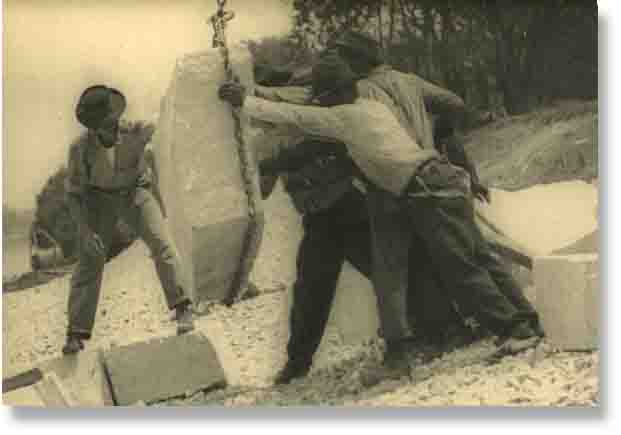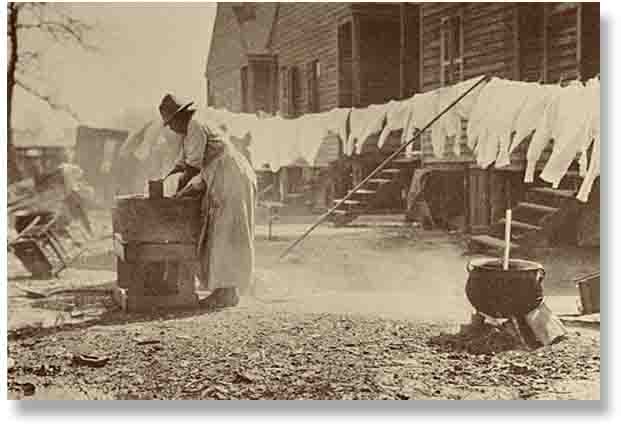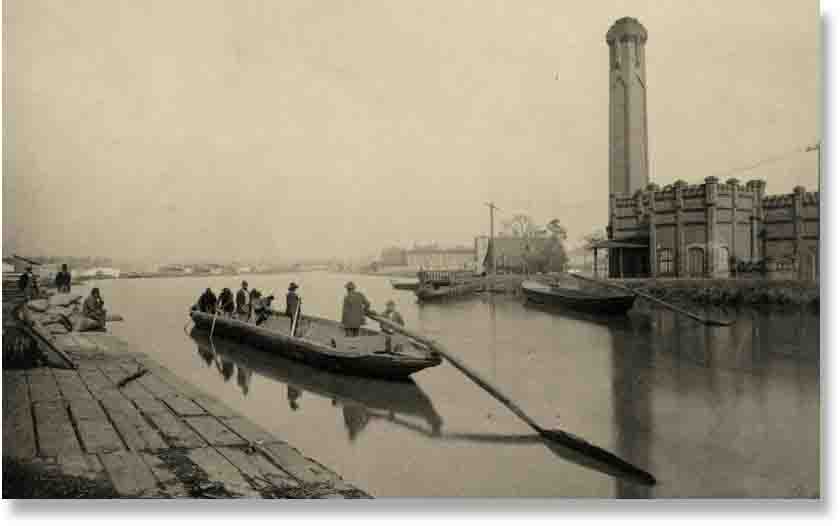 |
|||||
 |
|||||
HISTORY OF SPRINGFIELD
FREE AFRICAN AMERICANS IN THE OLD SOUTH
SPRINGFIELD: BEGINNINGS TO CIVIL WAR
CIVIL WAR, RECONSTRUCTION, AND THE NEW SOUTH
SPRINGFIELD BAPTIST AND AFRICAN AMERICAN EDUCATION
African American Men Working on the Augusta Levee, Early Twentieth Century. Before the Civil War, free African Americans worked as craftsmen, builders, and in other trades (Source: Augusta Museum of History).
Free African American women made an important contribution to the family's income, working in domestic industries as cooks, seamstresses, laundresses, weavers, and house servants. This late nineteenth-century photograph shows a woman washing laundry, reportedly in the vicinity of Fifteenth Street in Augusta (Source: Georgia Archives, Vanishing Georgia, Image ric195).
View of the Augusta Canal, Nineteenth-Century. Free African American men in port cities like Augusta made up a large portion of the labor force in waterfront and riverine trades, typically working as carters, stevedores, boatmen, and sometimes, riverboat captains (Source: Augusta Museum of History). |
FREE AFRICAN AMERICANS IN THE OLD SOUTH While the vast majority of African Americans in the South before the Civil War were enslaved, some were not. Free African Americans gained independence by a number of means, including running away from the plantation, being given their freedom by their owner, being taken from their plantation by British troops during the Revolutionary War, and by purchasing their freedom with money earned from crafts, industries, and gardening, as well as trapping, hunting, and fishing. Some freed African Americans left the South for northern cities, while others preferred to remain in the South where they were closer to friends and kin. In the South, free African Americans mostly lived in cities, Augusta and Savannah having the largest free African American communities in Georgia. Life in cities provided a number of employment opportunities that were not available in the countryside Although free African Americans were not owned by a master, like slaves, they did not enjoy the same freedoms as European-Americans. In Georgia, free African Americans were prohibited by law from owning land, renting property in some cities, preaching or speaking in public, as well as prohibited from smoking a pipe or cigar in public in both Augusta and Savannah. There were no schools for free African Americans and laws attempted to deny them the opportunity to learn to read and write. Laws also threatened their freedom – an 1833 Georgia law stated that a free African American who was convicted of leading an "idle" life could be sold back into slavery. As tensions increased in the years before the Civil War, some people even wanted to limit the types of work free African Americans were allowed to do, to prevent them from competing with European-Americans for better paying jobs. In Augusta and other southern cities, free African Americans made their living through a number of jobs. Men worked loading ships on the Savannah River and moving goods by wagon and carts from the warehouses to the docks. African Americans were also skilled craftsmen who worked as carpenters, masons, furniture makers, and potters. African American women and children also worked, as sewers, seamstresses, washers, cooks, and as household servants. Children as young as 5 years old worked within their mothers and siblings as domestic servants. For a free African American family, much of the day was spent at work and home was a place where they could rest at night, not a house that they owned and were able to take pride in. Community was very important to free African Americans and gave them the opportunity to interact with friends, socialize, and talk. The church was the center of free African American community and provided more than religious instruction; attending church services was also the way that free African Americans learned about national events as well as a public forum where people could talk about their concerns and fears. Springfield Baptist Church was the heart of the free African American Springfield community. The accomplishments of free African Americans helped undermine the foundations of slavery, and when the Civil War finally brought slavery to an end, free African Americans would help their formerly enslaved kinsmen learn to live in the free world. |
||


